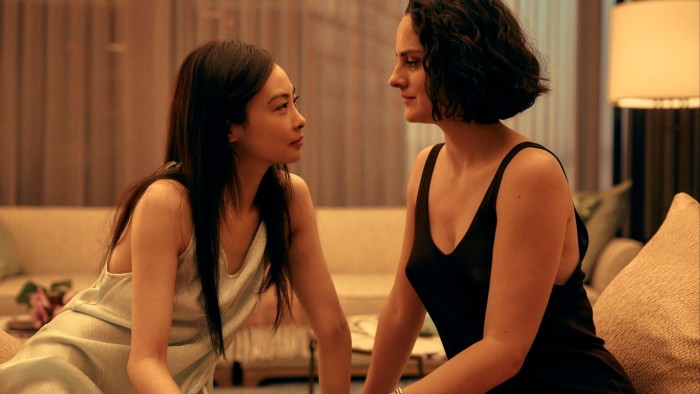Summarize this content to 2000 words in 6 paragraphs in Arabic In 1974, the French erotic film Emmanuelle was released in cinemas and caused a sensation with its profusion of nudity and sex. Two decades before the prevalence of online porn, here was sex on screen, not as the sordid pursuit of trench-coated men but firmly in the mainstream. The film ran at a theatre on the Champs-Élysées for more than a decade and spawned six sequels, seven TV films and multiple foreign-language versions, including the American spin-off Emmanuelle in Space.The conceit was female sexuality but the lens was pure male fantasy. A strange colonial fever-dream set in Bangkok, the film featured several acts of rape and a mysterious amount of nudity during conversation scenes. Now, French director Audrey Diwan, who adapted Annie Ernaux’s abortion memoir Happening in 2021, has rebooted the Seventies classic. This is the season of unabashedly erotic films — also in cinemas this month is Halina Reijn’s Babygirl, a much-hyped portrait of late female sexual discovery starring Nicole Kidman and Harris Dickinson.Diwan’s update arrives in cinemas with the benefit of 50 years of halting sexual liberation. While the original Emmanuelle’s sexual education was commanded by her husband, our modern Emmanuelle is single. She is on her way to Hong Kong to assess the standards of a luxury hotel in her capacity as a quality control inspector. The film has a habit of spelling out its themes and the metaphor is clear: her job is about regulated desire. What Emmanuelle needs to learn is that desire is not so predictable — she ought, instead, to be surprised by it.The erotic thrillers of the 1980s and 1990s, from ‘Fatal Attraction’ to ‘Basic Instinct’, were successful in traversing the porous boundaries between sex and dangerHow to explore sex in art without simply making something that resembles pornography — or that harnesses the male gaze and stock fantasy? The new Emmanuelle takes female desire as its subject, but it still works to the logic of pornography rather than life. In its opening scene, Emmanuelle (an elusive Noémie Merlant) sits in her aeroplane seat, bare legs stretched out. The camera lingers on them, as if from the perspective of the passenger across the aisle. She asks a hostess for lip balm, and then walks away. Sex in a plane toilet ensues.This is a film where it is totally natural for conversation with a stranger to quickly switch to asking when someone last had sex, or to spontaneously describing a recent erotic encounter. Everyone is always ready to have sex or talk of transgressing. As a result, the stakes shift: they aren’t of the real world, where to speak to a stranger of sex risks rejection, upset or confusion.Novelist Garth Greenwell describes sex as “a kind of crucible of humanness”. The task of depicting sex is to make it embodied and real, for it to exist not in a vacuum but as something characterised and significant — to paint humans in time rather than bodies in movement. In art, sex is an opportunity to portray our most base and purest instincts; to investigate how it might act as a means of connection or destruction; as a form of beauty, whim or power. Expressed on the page, it is easier to centre interiority and intention. (Bad sex writing tends to focus too much on what sex looks like rather than how it feels.) But sex on screen arrives with a hefty challenge. Film’s most popular mode of communicating sex — pornography — is one that reduces humanness.When the logic of real-world stakes is built into a film, that’s when the frenetic energy of desire can be most potent. The erotic thrillers of the 1980s and 1990s, from Fatal Attraction to Basic Instinct, were particularly successful in traversing the porous boundaries between sex and danger. The simultaneous exploration of crime and sex was a way of speaking to each one’s capacity for thrill and fear. But it also hinged on a woman’s sexual power being a synonym for danger.In Fatal Attraction, a brief fling between Glenn Close’s single Alex and Michael Douglas’s married Dan turns into violent obsession, putting Dan and his family at risk. In Babygirl, writer-director Reijn inverts the dynamic. Kidman plays Romy, married chief executive of a robot-controlled packaging company, who begins an affair with her intern Samuel (Dickinson). The stakes are high — “I could make one call, and you lose everything,” he points out, when she expresses worry about taking advantage.Babygirl’s Reijn inserts twists on the genre — “You knew the rules,” Dan shouts at Alex in Fatal Attraction; “What rules?” she retorts. In Babygirl, Samuel demands that they set rules first to ensure they know what to expect of each other. Instead of female desire being dangerous, Reijn shifts the risk to stifled desire. The cliff-edge that Romy teeters over is built from years spent ignoring what she wants. Reijn makes an erotic thriller without deranging the female lead. But the jeopardy shrinks away once desire has been recognised. Danger simmers rather than boils. “To me,” Reijn said in a recent interview, “real, shocking sex is about what is in the mind. It’s all suggestion. It’s all imagination . . . Real sex acts to me onscreen are quite boring.” Instead, she leans in to the nuance of desire and makes a different kind of fable: that we have a duty to make sense of it.Male desire has long dominated cultural representations of sex, even in portrayals of female desire. Film has perhaps the hardest battle against inherited ideas around sexuality and the male gaze.Half a century after Emmanuelle’s male-as-can-be portrait of a woman, how much closer are we to centring female desire on screen? Now, it is more likely to be taken seriously, rather than othered or fetishised. But a record of metaphors tells another story. The original Emmanuelle didn’t trade in literary devices, but in Fatal Attraction, desire was shown as a bubbling pot of coffee (and later, a boiling bunny); in Babygirl, it is an unleashed dog; in the updated Emmanuelle, a cyclone. Sometimes metaphors simply paint an image better. Other times they draw attention to an idea we are still finding a way to translate.‘Babygirl’ is in cinemas now. ‘Emmanuelle’ is in UK cinemas from January 17Find out about our latest stories first — follow FT Weekend on Instagram and X, and sign up to receive the FT Weekend newsletter every Saturday morning
رائح الآن
rewrite this title in Arabic Can erotic films move beyond pornography?
مال واعمال
مواضيع رائجة
النشرة البريدية
اشترك للحصول على اخر الأخبار لحظة بلحظة الى بريدك الإلكتروني.
© 2026 جلوب تايم لاين. جميع الحقوق محفوظة.









